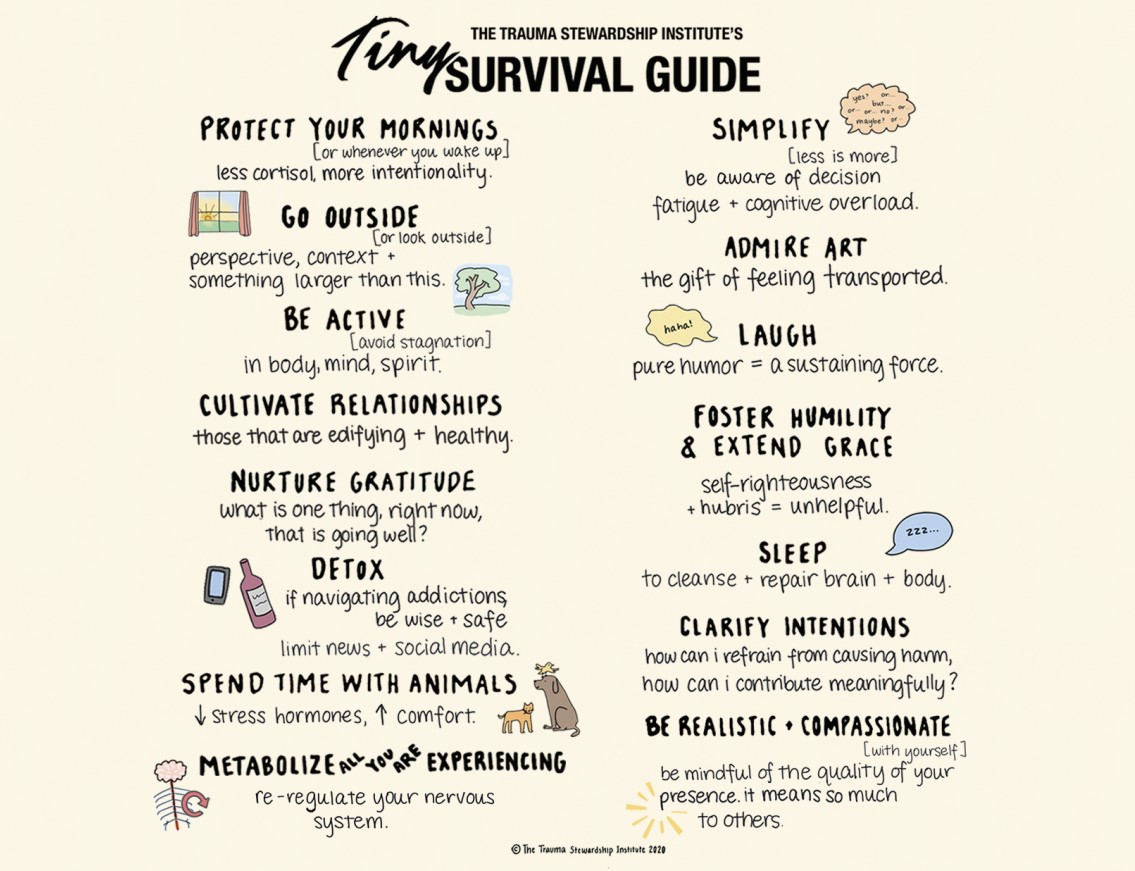 |
| McKenzie Wren, MPH, Wren Consulting |
The link to the recording of the webinar "Engaging with The Tiny Survival Guide" can be found under Webinar Recordings.
"Adult providers need healing too! Healing centered engagement requires that we consider how to support adult providers in sustaining their own healing and well-being. We cannot presume that adulthood is a final, trauma-free destination. Healing is an ongoing process that we all need, not just young people who experience trauma.” - Shawn Ginwright, The Future of Healing: Shifting from Trauma-Informed Care to Healing-Centered Engagement

Think of cortisol as nature’s built-in alarm system. It’s your body’s main stress hormone. It works with certain parts of your brain to control your mood, motivation, and fear. Your adrenal glands -- triangle-shaped organs at the top of your kidneys -- make cortisol. Protect your mornings could mean taking a few deep breaths to center yourself, it could mean exercising or meditating. It could mean walking your dog. It could just mean a few moments of calm with a morning beverage. Practice deep breathing exercises: Controlled breathing helps stimulate your parasympathetic nervous system, your “rest and digest” system, which helps lower cortisol levels.
- Spending time in nature can act as a balm for our busy brains. Both correlational and experimental research have shown that interacting with nature has cognitive benefits.
- As a general goal, aim for at least 30 minutes of moderate physical activity every day.
- Reducing sitting time is important, too. The more hours you sit each day, the higher your risk of metabolic problems
- Cultivate relationships
- 1-Trust. Trust is an important part of every relationship. ...
- 2- Respect. In close relationships, it's important to have mutual respect for one another and treat each other kindly. ...
- 3- Honesty. ...
- 4- Affection. ...
- 5- Communication. .... Support, trust, and honesty are givens.
- In positive psychology research, gratitude is strongly and consistently associated with greater happiness. Gratitude helps people feel more positive emotions, relish good experiences, improve their health, deal with adversity, and build strong relationships. Begin and end your day with three things you're grateful for.
- Practice awareness of the things you intake including alcohol, drugs, technology, food, etc.
- Laughing promotes the release of endorphins and suppresses cortisol. Participating in hobbies and fun activities can also promote feelings of well-being, which may lower your cortisol levels.
- Humility and grace allows us to show up as flawed humans and extend care and compassion - even when we have differences.
- Practice awareness of how you show up and be aware of any difference between your intention and your impact.
- Sleep deprivation can put your health and safety at risk, which is why it’s essential that you prioritize and protect your sleep on a daily basis. Just like you prioritize your diet and physical activity, it’s time to give sleep the attention it deserves.
Tree of Contemplative Practices
Stress reduction techniques include practices such as visualization and meditation, artistic expression, physical movement, reading inspirational texts, serving and volunteering, rituals and ceremonies and deep listening and dialogue. The tree “demonstrate(s) a variety of forms of contemplative practice. https://www.contemplativemind.org/practices/tree
The spiral shows different types of emotions and provides a visual representation of how focusing on developing positive emotions can amplify feelings of wellbeing - even when there are problems and life is stressful. It reminds us that “It's not what happens to you, but how you react to it that matters.” - Epictetus
